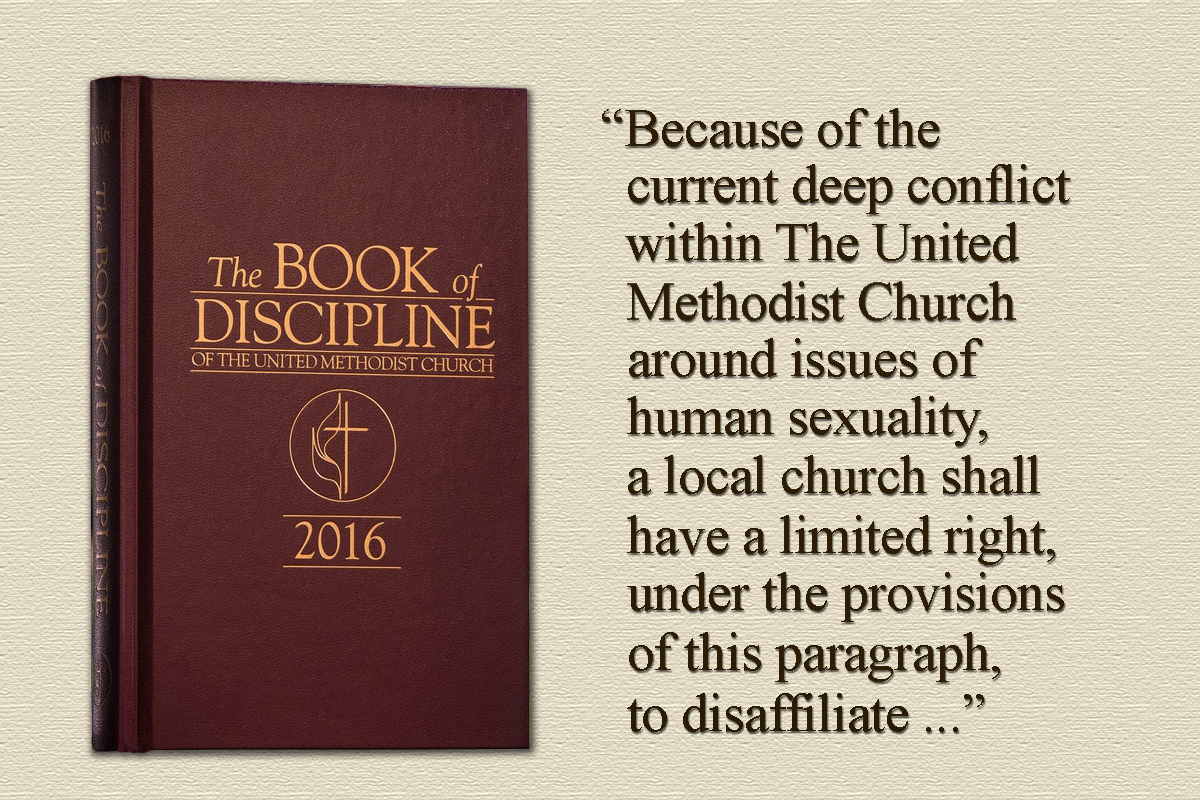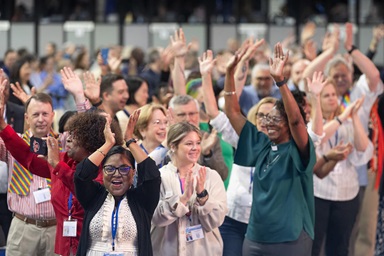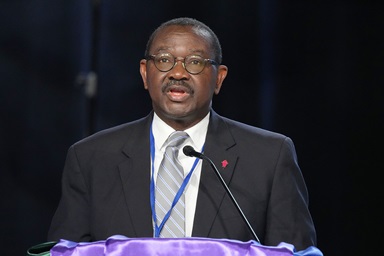Key points:
- The Judicial Council released the first batch of decisions from its 22-item fall docket.
- All six rulings deal with questions raised about a new provision that allows churches to leave the denomination with property if they meet certain criteria.
The United Methodist Church’s top court released six decisions Feb. 9 related to a new provision governing how congregations can leave the denomination with property.
All six rulings from the United Methodist Judicial Council stem from questions of law raised about the Book of Discipline’s new Paragraph 2553 — approved by the 2019 Special General Conference in St. Louis.
Passed during the same legislative assembly that strengthened church bans against same-sex weddings and “self-avowed practicing” gay clergy, the church law allows congregations to exit with property for “reasons of conscience” related to homosexuality if they meet certain requirements.
The disaffiliation plan offers a limited way to release congregations from The United Methodist Church’s centuries-old trust clause, which states that church property is held in trust for the benefit of the entire denomination. The provision permits such disaffiliations through Dec. 31, 2023.
In 2019, the Judicial Council upheld Paragraph 2553 as in line with the denomination’s constitution. In that ruling, the church court also spelled out that any disaffiliation must include:
- Approval for disaffiliation by at least a two-thirds majority of a church’s professing members present at the vote.
- Establishment of terms and conditions between the exiting local church and the conference board of trustees.
- Ratification of a church’s disaffiliation by a simple majority at annual conference.
Already more than 130 U.S. congregations have used Paragraph 2553 to part ways with the denomination. However, that is a small fraction of the more than 31,000 United Methodist churches in the U.S.
The provision also continues to spark questions of law at annual conference sessions. The Discipline — the denomination’s policy book — requires bishops to respond to questions of law raised during the sessions at which they preside and that any bishop’s decision of law go before the Judicial Council for review.
The new Judicial Council rulings cover decisions of law that bishops made during the 2020 and 2021 annual conference seasons.
One question before the court was whether annual conference members can amend a congregation’s disaffiliation agreement when it comes to the floor for a vote.
In Decision 1420, the Judicial Council affirmed the decision of law by North Georgia Conference Bishop Sue Haupert-Johnson that an annual conference’s authority is limited to a simple yes or no vote.
The church court notes that under the Discipline, a local church “cannot sever its connectional relationship to The United Methodist Church without the consent of the annual conference.” The Judicial Council has construed this provision to mean that the annual conference must ratify any disaffiliation agreement.
“Consequently, ratification in this context denotes the retroactive approval by a vote up or down by the members of an annual conference but does not include the right to amend the disaffiliation agreement,” the church court ruled.
In Decision 1422, the Judicial Council affirmed another decision by Haupert-Johnson. During annual conference, a lay member asked the bishop whether a church that identifies itself as traditional could use Paragraph 2553. In this context, “traditional” means a church that supports the denominational restrictions around homosexuality.
Haupert-Johnson said she found no ruling of law was required “because the North Georgia Annual Conference Board of Trustees has indicated that it will not question ‘the reasons of conscience’ behind a church’s decision to disaffiliate.”
The North Georgia Conference and its largest-member church, Mt. Bethel, are engaged in a civil lawsuit and countersuit in county court over church property. Mt. Bethel has invoked Paragraph 2553 in making its case.
However, the United Methodist Judicial Council made no mention of that court case, and explicitly said it was focusing on the questions of law submitted to it.
In Decision 1421, the Judicial Council addressed two questions: Whether the sale of property can be completed before the conference votes and whether the conference board of trustees can enter into a nondisclosure agreement with a departing church.
The church court said the Alabama-West Florida Conference Board of Trustees acted unlawfully by closing sale on the property of a church before the annual conference voters ratified the disaffiliation agreement.
“The execution, delivery, and filing for record of any deed to property cannot be accomplished prior to such ratification,” the Judicial Council ruled.
However, the church court also said that the board of trustees can enter into a nondisclosure agreement as part of a negotiated settlement, where permitted by local laws. The ruling reversed in part and modified in part a decision by Bishop David Graves.
Judicial Council member Beth Capen wrote a separate opinion, concurring in part and dissenting in part with the ruling. She agreed that the annual conference should vote on any disaffiliation settlement before property changes hands. Specifically, she said it was improper that the conference board executed the quitclaim deed and release of trust clause months ahead of the annual conference vote.
But she disagreed with the use of a nondisclosure agreement. “The Annual Conference must have access to all information concerning a congregation’s proposed disaffiliation,” she wrote.
Judicial Council member Warren Plowden, chancellor for the South Georgia Conference, recused himself from deliberating on the decision related to the Alabama-West Florida Conference because the two conferences now share a bishop.
In Decision 1423, the Judicial Council affirmed a decision by New England Conference Bishop Sudarshana Devadhar that United Methodist clergy members in good standing can make a motion for a church’s disaffiliation.
“Clergy members have the right to vote on disaffiliation resolutions that come before an annual conference,” the Judicial Council ruled. “This voting right includes the right to make a motion to approve such resolutions.”
The Judicial Council also agreed with Devadhar that one of the questions he faced was parliamentary in nature and outside the Judicial Council’s jurisdiction.
In two decisions, the Judicial Council dealt with what terms an annual conference can set for any disaffiliation agreement within its boundaries. Paragraph 2553 says annual conferences “may develop additional standard terms that are not inconsistent with the standard form of this paragraph.”
In Decision 1424, the church court affirmed Arkansas Conference Bishop Gary Mueller’s decision that “the requirement that Arkansas Annual Conference Board of Trustees seek ‘repayment of district, annual conference or general church grants made in the past 10 years, excluding benevolent grants’ does not invalidly negate, ignore or violate church law.”
In Decision 1425, the Judicial Council also affirmed Devadhar’s decision that the New England Conference can require churches considering disaffiliation to go through at least an eight-month discernment process, seek assessments of the impact of the departure and hold at least four listening sessions with members.
The Judicial Council’s ruling said the disaffiliation process established by General Conference constitutes minimum standards, “which do not preclude additional procedures and standard terms created by annual conferences, provided that the latter do not negate or violate the former.”
The Judicial Council is continuing to deliberate on a 22-item fall docket. Because of the COVID-19 pandemic, the church court has been meeting online over a period of months and publishing decisions as they are ready.
Hahn is assistant news editor for UM News. Contact her at (615) 742-5470 or newsdesk@umcom.org. To read more United Methodist news, subscribe to the free Daily or Friday Digests.
Like what you're reading? Support the ministry of UM News! Your support ensures the latest denominational news, dynamic stories and informative articles will continue to connect our global community. Make a tax-deductible donation at ResourceUMC.org/GiveUMCom.



